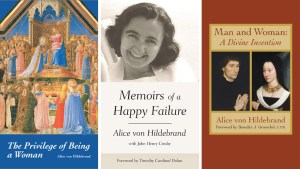Lenten Campaign 2025
This content is free of charge, as are all our articles.
Support us with a donation that is tax-deductible and enable us to continue to reach millions of readers.
Alice von Hildebrand, famed Catholic philosopher and college professor, died last week at age 98. She had devoted her life to advancing the thought of her late husband, Dietrich von Hildebrand. But her work as a teacher, writer, and speaker stands on its own merits.
In particular, she wrote often about the fundamental things in life — those transcendental truths that stand immutably in the face of moral relativism. To honor her life and work, here are 5 quotations from her work that give insight into what really matters.
Our strength comes not from ourselves but from God
“To be conscious of one’s weakness and to trust in God’s help is the way to authentic strength and victory.”
A human soul has immortal worth and dignity
“One thing is certain: When the time has come, nothing which is man-made will subsist. One day, all human accomplishments will be reduced to a pile of ashes. But every single child to whom a woman has given birth will live forever, for he has been given an immortal soul made to God’s image and likeness.”
There is nothing so gentle as real strength
“The great mistake is to believe the opposite of strength is gentleness. It’s not true at all. Strength and gentleness belong together – you find this in Christ, who is so strong and simultaneously meek of heart, you find that in the Saints. What is the opposite of strength is weakness and cowardice.”
You are worthy because of who you are, not what you accomplish
“The less we respect ourselves as persons made to God’s image, the more shall we be led to identifying ourselves with our social role, our job, our accomplishments, real or imaginary. We are led to believe that success in life lies primarily in our being able to bring credentials, and yet, who would dream of saying to another person, “I love you because you are the most efficient secretary I have met in my life,” or because “you are the teacher who best organizes his material.” Love is not concerned with a person’s accomplishments, it is a response to a person’s being, this is why a typical word of love is to say, ‘I love you, because you are as you are.’”’
The purpose of education is to teach truth
“There are things that do not change, which have an absolute and transcendent validity, and which every person has a right to know. Religiously, morally, humanly, and politically our great nation can only hope to survive if it stands firmly on the ground of truth and gives its children the bread for which they hunger. This is the great task of education.”

